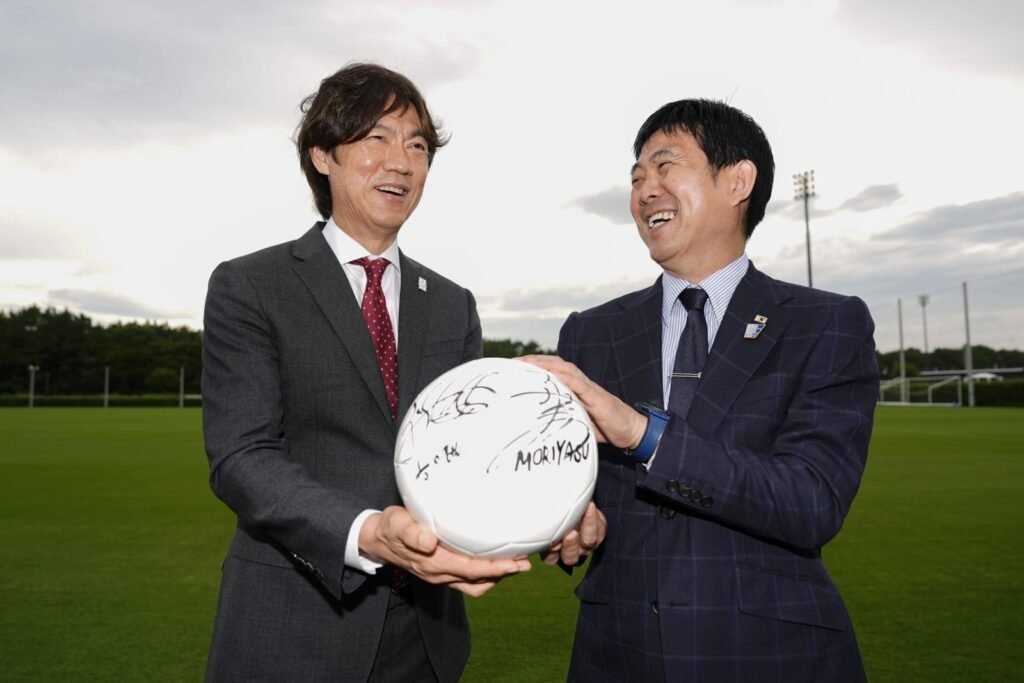A Legacy of Rivalry and Mutual Growth
The current leaders of two of Asia’s most successful footballing nations, Japan’s Hajime Moriyasu and South Korea’s Hong Myung Bo, believe their teams will continue to inspire each other as they dream of a future World Cup final. Their conversation with Kyodo News on the 60th anniversary of diplomatic normalization between the two countries highlights not only the deep historical connection between them but also the evolution of their footballing relationship.
Moriyasu, who once played as a defensive midfielder, recalls his first encounter with Hong during a 0-0 draw at the Dynasty Cup in Beijing in August 1992. “I was happy to be part of the long history between the countries,” he said. He emphasized that the rivalry between Japan and South Korea brings about mutual growth, as both nations place immense pressure on their players when facing each other.
Hong, a former defender who made his World Cup debut in Italy in 1990, described the rivalry as more than just a competition. “Players from each side put their pride on the line and feel the emotion, nervousness, and more during the preparation process before heading in,” he said. The two nations have met 78 times, with South Korea winning 40, Japan 15, and 23 games ending in draws.
Since the J-League began in 1993, the rivalry has remained intense, with nine wins apiece and 10 draws. One notable match was in October 1993, when Kazuyoshi Miura’s goal gave Japan a 1-0 win against South Korea in the Asian final-round World Cup qualifiers. However, this victory was followed by the “Tragedy of Doha,” where Japan missed the 1994 finals due to a late Iraq equalizer.
Despite this setback, Hong believed that Japan was on the right path. “I strongly felt Japan would eventually make the World Cup,” he said. Since 1997, the two nations have not been grouped together in World Cup qualifying, though their encounters have continued to shape their footballing development.
The 2002 World Cup marked a turning point for both countries, as they co-hosted the event. Japan reached the last 16 for the first time, while South Korea stunned Portugal, Italy, and Spain en route to finishing fourth. Moriyasu called it a “momentous” tournament, highlighting the cooperation between nations and associations.
Hong recalled a pivotal speech by Dutch manager Guus Hiddink before South Korea’s last 16 tie with Italy. “Hiddink implored, ‘don’t get satisfied by reaching this stage’ and ‘we’ll aim much higher.’ The players’ motivation was reignited by that.”
Both managers have had successful careers, with Moriyasu winning three J1 titles with Sanfrecce Hiroshima and leading Japan after the 2018 World Cup. Hong, who managed South Korea at the 2014 finals, returned to the role in 2024 after guiding Ulsan Hyundai to back-to-back K-League titles.
Their philosophies align on the importance of team spirit and dedication. “I put extreme emphasis on how players positively influence the team and how much they can devote to it,” Hong said. Moriyasu echoed this sentiment, emphasizing mutual respect among team members.
Looking ahead, both nations are aiming for greater success. Japan is set to make their eighth straight World Cup appearance, while South Korea will appear for the 11th consecutive time. Moriyasu expressed hope for a future meeting in the World Cup final, stating, “If we and South Korea can face each other in the final at the next World Cup or another in the future, I’ll be really happy.”
Hong, who set a last-16 berth as a target, also hopes for a rematch in the future. Both managers believe football can play a role in fostering better relations between the two countries.
Moriyasu reflected on past moments of unity, such as the banner at the 1998 World Cup qualifier reading, “Let’s go to France together.” He also mentioned the support from Japanese fans during the 2002 World Cup, hoping for a new future built on these connections.
As both managers look forward, they emphasize the importance of leaving a legacy for future generations. “If Japan and South Korea getting connected as good footballing rivals and friends were to influence broader society, I’d be happy,” Moriyasu said.

